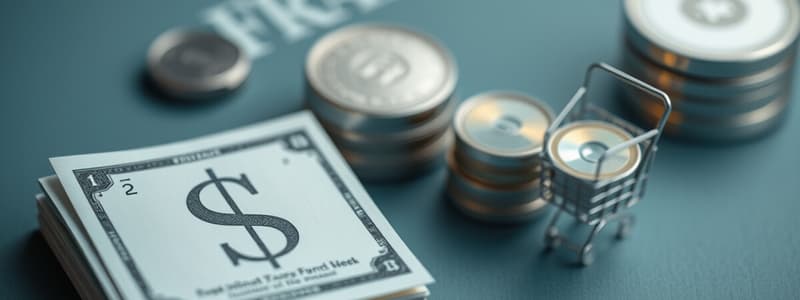Podcast
Questions and Answers
Economics is a study of consumer ______.
Economics is a study of consumer ______.
- Supply
- Availability
- Choices (correct)
- Demand
Every country has a unique ______ that includes its leadership, the way it makes decisions, and how the country's citizens buy stuff.
Every country has a unique ______ that includes its leadership, the way it makes decisions, and how the country's citizens buy stuff.
- Command economy
- Economic system (correct)
- Supply and demand
- Entrepreneurship
The U.S is mostly a
The U.S is mostly a
- Free market (correct)
- Demand
- Focused economy
- GDP
What you choose to __________ has a(n) ___________ on the economies of other countries.
What you choose to __________ has a(n) ___________ on the economies of other countries.
Economic interdependence ____________.
Economic interdependence ____________.
A ____________ economy is built on primary industries such as fishing and farming, and it generally has very little waste and very little surplus.
A ____________ economy is built on primary industries such as fishing and farming, and it generally has very little waste and very little surplus.
Equilibrium is....
Equilibrium is....
The buying and selling of various goods and services is called ____________.
The buying and selling of various goods and services is called ____________.
_____________ is the science of the whole economy, while _____________ is the study of people, individual businesses, or markets.
_____________ is the science of the whole economy, while _____________ is the study of people, individual businesses, or markets.
You can depend on the people in power to either make you wealthy or make you poor.
You can depend on the people in power to either make you wealthy or make you poor.
Supply and demand helps us understand how the _________ of a particular product and the _________ for it affect the price of the item.
Supply and demand helps us understand how the _________ of a particular product and the _________ for it affect the price of the item.
A product that's sold to the global market is called _________ while a product that's bought from another country is called ___________.
A product that's sold to the global market is called _________ while a product that's bought from another country is called ___________.
Which factor of production refers to the man-made objects like tools, machinery, buildings, and equipment needed for production?
Which factor of production refers to the man-made objects like tools, machinery, buildings, and equipment needed for production?
Socialism is an example of a _________ economy where the __________ is/are at the center.
Socialism is an example of a _________ economy where the __________ is/are at the center.
__________ is the desire to make a profit, and it isn't greedy. It keeps businesses in ___________.
__________ is the desire to make a profit, and it isn't greedy. It keeps businesses in ___________.
Wind, water, and solar energy are examples of _____________.
Wind, water, and solar energy are examples of _____________.
The series of steps it takes to produce a product is called the...
The series of steps it takes to produce a product is called the...
___________ doesn't/don't exist in a command economy because there are fewer options for goods and services and they're controlled by the government.
___________ doesn't/don't exist in a command economy because there are fewer options for goods and services and they're controlled by the government.
________ is an official ban on trade with a country.
________ is an official ban on trade with a country.
Inflation, deflation, the rate of economic growth, price levels, national income, changes in employment rates, and GDP are all called _______.
Inflation, deflation, the rate of economic growth, price levels, national income, changes in employment rates, and GDP are all called _______.
_________ never really works for an economy because there's little innovation and no reward for starting a business, as well as an unmotivated labor force because workers are often assigned jobs.
_________ never really works for an economy because there's little innovation and no reward for starting a business, as well as an unmotivated labor force because workers are often assigned jobs.
Flashcards are hidden until you start studying
Study Notes
Economics and Consumer Choices
- Economics studies consumer choices, focusing on how decisions affect markets.
- A country’s economic system encompasses its leadership, decision-making processes, and consumer purchasing habits.
U.S. Economic Structure
- The U.S. primarily operates under a free market economy, promoting private enterprise and minimal government interference.
Global Interdependence
- Economic interdependence describes the reliance of countries and companies on one another for goods, services, and financial stability.
Economic Models
- A traditional economy typically relies on primary industries like fishing and farming, with low waste and surplus.
Market Equilibrium
- Equilibrium occurs when market supply matches demand, leading to stable pricing.
Trade Dynamics
- Trade involves the buying and selling of goods and services globally, enhancing economic relationships between nations.
Economic Studies
- Macroeconomics examines the overall economy, while microeconomics focuses on individual markets and businesses.
Price Influences
- Supply and demand dynamics explain how product availability and consumer desire dictate pricing.
Imports and Exports
- Exports are goods sold to international markets, while imports are goods purchased from other countries.
Production Factors
- Capital refers to man-made objects necessary for production, like tools and machinery.
Economic Systems
- Socialism is a type of command economy where the government plays a central role in economic activities.
Profit Motivation
- The profit motive is essential for keeping businesses operational and profitable, reflecting a healthy market environment.
Resource Classifications
- Renewable resources, such as wind, water, and solar energy, can be replenished naturally.
Production Process
- The chain of production outlines the sequence of steps taken to produce a product.
Competition in Economies
- In a command economy, competition is lacking due to limited consumer options, leading to government control over resources.
Trade Restrictions
- An embargo is a formal ban on trade with a specific country, often used as a political tool.
Economic Indicators
- Key economic indicators include inflation rates, national income, and GDP, which assess economic health and trends.
Socialism Challenges
- Socialism may hinder economic innovation and motivation, as government assignments can lead to an unmotivated workforce.
Studying That Suits You
Use AI to generate personalized quizzes and flashcards to suit your learning preferences.





